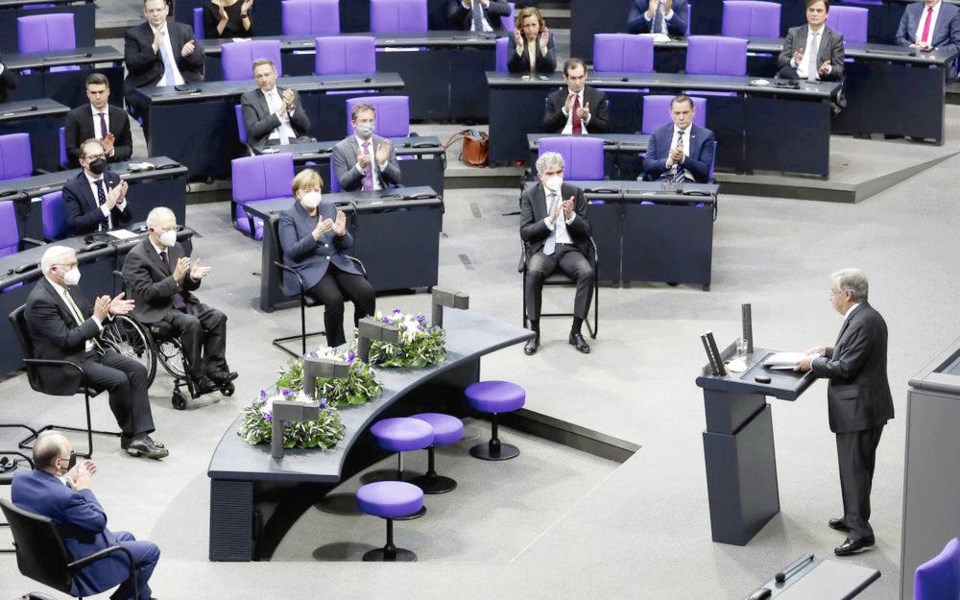On Dec. 2, UN Secretary General Antonio Guterres gave an important if somewhat overlooked speech at Columbia University’s World Leaders Forum on the state of the planet.
Guterres was blunt: “To put it simply, the state of the planet is broken,” he said. “Humanity is waging war on nature” – and that is “suicidal.”
It’s worth quoting in full the litany of problems he laid out, because this is the challenge we face throughout the 21st century, and especially in the 2020s: “Biodiversity is collapsing. One million species are at risk of extinction. Ecosystems are disappearing before our eyes. Deserts are spreading. Wetlands are being lost. Every year, we lose 10 million hectares of forests. Oceans are overfished — and choking with plastic waste.
“The carbon dioxide they absorb is acidifying the seas. Coral reefs are bleached and dying. Air and water pollution are killing nine million people annually — more than six times the current toll of the pandemic. And with people and livestock encroaching further into animal habitats and disrupting wild spaces, we could see more viruses and other disease-causing agents jump from animals to humans.”
Guterres then turned his attention specifically to climate change, pointing to two new authoritative reports from the World Meteorological Organization and the UN Environment Programme that spell out how close we are to climate catastrophe.
The past decade was the hottest in human history, he said. Ocean heat is at record levels. Arctic sea ice in October was the lowest on record, and now re-freezing has been the slowest on record.
Greenland ice has continued its long-term decline, permafrost is melting and releasing methane, a potent greenhouse gas. Apocalyptic fires and floods, cyclones and hurricanes are increasingly the new normal. Carbon dioxide levels are still at record highs and rising.
In 2020, the upward trend has continued despite the pandemic. Methane, a potent greenhouse gas, soared even higher – to 260 per cent of pre-industrial levels, he said.
Today, he added, “we are at 1.2 degrees of warming and already witnessing unprecedented climate extremes and volatility in every region and on every continent. We are headed for a thundering temperature rise of 3 to 5 degrees Celsius this century. The science is crystal clear: to limit temperature rise to 1.5-degrees Celsius above pre-industrial levels, the world needs to decrease fossil fuel production by roughly six per cent every year between now and 2030. Instead, the world is going in the opposite direction — planning an annual increase of two per cent.”
But Guterres did not give way to despair. While human activities are at the root of our “descent towards chaos,” human action can help solve it, he said. “Making peace with nature is the defining task of the 21st century. It must be the top, top priority for everyone, everywhere.”
Our work must begin with facing the facts and acknowledging the challenges we face. As Guterres makes clear, this litany of challenges calls for resolve.
We must – and we can – turn this around. The good news is that in many cases, we have long understood the solutions we need to implement. Indeed, they largely exist already, and in many cases are being applied in some places around the world.
So my resolve in 2021 is to focus as much as I can on the solutions — not the solutions that are “out there,” but the solutions that are right here. Inspired by the McGill University-based project Seeds of Good Anthropocenes, which documents examples of existing initiatives that hold the potential to shape “a more just, prosperous, and ecologically diverse world,” the Conversations for a One Planet initiative I founded will spend 2021 focusing on the Seed of a One Planet Region to be found right here in Greater Victoria.
We will bring stories of hope and practical application to our monthly Conversations, and we are also planning to create a Seeds Catalogue – an online resource that will help people connect to, learn from and be inspired by what I am calling the One Planeteers.
Stay tuned.
Dr. Trevor Hancock is a retired professor and senior scholar at the University of Victoria’s School of Public Health and Social Policy.



